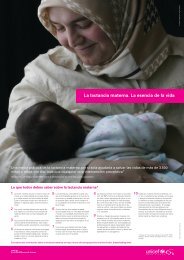SEXUAL ABUSE AND EXPLOITATION OF BOYS IN SOUTH ASIA A ...
SEXUAL ABUSE AND EXPLOITATION OF BOYS IN SOUTH ASIA A ...
SEXUAL ABUSE AND EXPLOITATION OF BOYS IN SOUTH ASIA A ...
Create successful ePaper yourself
Turn your PDF publications into a flip-book with our unique Google optimized e-Paper software.
In 1998, the National Child Protection Authority Act established an interdisciplinary<br />
governmental body to address sexual exploitation, trafficking, forced labour and illegal<br />
adoption. At its inception, the National Child Protection Authority (NCPA) was a semiindependent<br />
authority reporting directly to the prime minister. Its mandate included advising<br />
the government on prevention of child abuse and protection of children, recommending<br />
reforms for effective implementation of national policy and monitoring the implementation of<br />
Sri Lankan law in protecting children from abuse and exploitation. As well as government<br />
representatives from the Ministry of Labour, the Probation and Child Care Services<br />
Department, police and Attorney General’s office, the NCPA also includes psychologists,<br />
paediatricians and psychiatrists who promote research on child abuse, support quality<br />
rehabilitation and reintegration practices, and work with civil society organizations to<br />
mobilize campaigns and training programmes on child abuse in schools and communities.<br />
The NCPA has conducted training programmes for police, probation officers, caregivers and<br />
legal authorities on child-friendly court procedures and child interviewing methodologies. It<br />
has also produced a guide, ‘Interviewing Children: Video Interviewing Manual’. The NCPA<br />
has worked with physicians, police and psychologists to collect forensic information on child<br />
abuse and has produced a manual for doctors on medical forensic investigation of sexual<br />
abuse. To strengthen linkages and referral mechanisms at the community level, the National<br />
Child Protection Authority Act dictated the establishment of district child protection<br />
committees. These committees, established in 13 districts, coordinated the activities of<br />
probation workers, caregivers, police, judiciary and health workers at the local level. Several<br />
years ago, however, the NCPA was incorporated into government bureaucracy, and it no<br />
longer reports directly to the prime minister. Having lost its autonomy, the NCPA’s<br />
productive output has diminished in the last few years.<br />
In 2004, the Sri Lanka Tourist Board and the Ministry of Tourism, with UNICEF support,<br />
developed a background paper and Plan of Action for the Protection of Children from Sexual<br />
Exploitation in Travel and Tourism. The Plan of Action extended for a three-year period,<br />
from 2005 through 2007, and included a description of activities to be conducted, budget and<br />
timeframe for action. Its strategic objectives included prevention by creating community<br />
awareness of sexual exploitation of children through tourism in source areas of the country. It<br />
also was meant to create ‘cautionary awareness’ among tourists that Sri Lanka has zero<br />
tolerance for tourism aimed at sexual exploitation of children, and that perpetrators will be<br />
arrested and prosecuted using the tourists’ home country extraterritorial legislation as well as<br />
Sri Lankan law. The Plan of Action encouraged the government – as in the NPATC – to<br />
review existing laws and policies and implement new ones to address tourism based on<br />
sexual exploitation of children. As with the NPATC, the Plan of Action aimed to coordinate<br />
police, social services authorities, district child protection committees and NGOs in tourist<br />
areas. Finally, it intended to develop the project management capacity of the Tourist Board.<br />
While this Plan of Action is commendable, it repeats many objectives and actions designated<br />
for the NCPA in the National Child Protection Authority Act. These include coordination of<br />
local stakeholders, review of legislation and awareness activities for police and community<br />
members. At the same time, its provisions for mobilizing the private tourism sector are weak,<br />
primarily limited to adherence to a code of conduct and some awareness activities. In<br />
140










